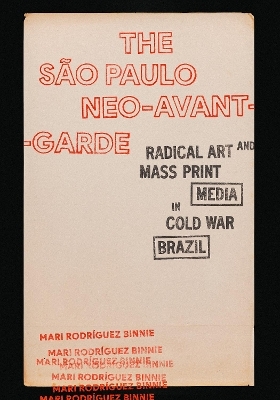
The São Paulo Neo-Avant-Garde
Radical Art and Mass Print Media in Cold War Brazil
Seiten
2024
University of Texas Press (Verlag)
978-1-4773-2986-3 (ISBN)
University of Texas Press (Verlag)
978-1-4773-2986-3 (ISBN)
How artists challenged a military dictatorship through mass print technologies in 1970s and 1980s São Paulo.
Throughout the 1970s and into the 1980s, during Brazil's military dictatorship, artists shifted their practices to critique the government and its sanitized images of Brazil, its use of torture, and its targeted persecutions. Mari Rodríguez Binnie's The São Paulo Neo-Avant-Garde examines these artworks and their engagement with politics and mainstream art institutions and practices.
As Binnie skillfully shows, artists appropriated processes like photocopy, offset lithography, and thermal and heliographic printing, making newly available technologies of mass production foundational to their work of resistance against both the dictatorship and the established art world. Often working collaboratively, these artists established alternative networks of exchange locally and internationally to circulate their work. As democracy was reestablished in Brazil, and in the decades that followed, their works largely fell out of sight. Here, in the first English-language book to focus entirely on conceptual practices in São Paulo in the 1970s and 1980s, Binnie unearths a scene critical to the development of contemporary Brazilian Art.
Throughout the 1970s and into the 1980s, during Brazil's military dictatorship, artists shifted their practices to critique the government and its sanitized images of Brazil, its use of torture, and its targeted persecutions. Mari Rodríguez Binnie's The São Paulo Neo-Avant-Garde examines these artworks and their engagement with politics and mainstream art institutions and practices.
As Binnie skillfully shows, artists appropriated processes like photocopy, offset lithography, and thermal and heliographic printing, making newly available technologies of mass production foundational to their work of resistance against both the dictatorship and the established art world. Often working collaboratively, these artists established alternative networks of exchange locally and internationally to circulate their work. As democracy was reestablished in Brazil, and in the decades that followed, their works largely fell out of sight. Here, in the first English-language book to focus entirely on conceptual practices in São Paulo in the 1970s and 1980s, Binnie unearths a scene critical to the development of contemporary Brazilian Art.
Mari Rodríguez Binnie is an assistant professor of art history at Williams College and at the Graduate Program in the History of Art at the Sterling and Francine Clark Art Institute.
List of Illustrations
Introduction
Chapter 1. Off and On
Chapter 2. Redaction
Chapter 3. The Geometry of Dissent
Chapter 4. “El arte se hace en fotocopias”
Coda
Acknowledgments
Notes
Archives and Sources
Bibliography
Index
| Erscheinungsdatum | 18.09.2024 |
|---|---|
| Zusatzinfo | 85 illustrations |
| Verlagsort | Austin, TX |
| Sprache | englisch |
| Maße | 178 x 254 mm |
| Gewicht | 680 g |
| Themenwelt | Kunst / Musik / Theater ► Kunstgeschichte / Kunststile |
| Geisteswissenschaften ► Geschichte ► Regional- / Ländergeschichte | |
| ISBN-10 | 1-4773-2986-2 / 1477329862 |
| ISBN-13 | 978-1-4773-2986-3 / 9781477329863 |
| Zustand | Neuware |
| Informationen gemäß Produktsicherheitsverordnung (GPSR) | |
| Haben Sie eine Frage zum Produkt? |
Mehr entdecken
aus dem Bereich
aus dem Bereich
Erinnerungen
Buch | Softcover (2024)
Pantheon (Verlag)
16,00 €


